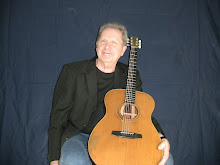Winter has certainly moved in, and I’ll admit it - I’m finding this last phase of the tour a challenge to my morale.
For a good few days now, my attempts to locate the necessary inspiration that would help create the motivation to put finger to keypad, have met with no success - despite this being the very thing that usually lifts the spirits.
I’m so curious as to how many out there ‘handle’ their ambitions.
By that, I don’t necessarily mean the stereotypical ambitions - the ambition to ‘get on’ in life, to make lots of money, etc. I mean whatever it is that one can only ignore at a significant cost to the spirit and the morale of that individual.
My observations lead me to consider that there are those who without too much hesitation follow what they feel is intrinsically correct for them. They, perhaps, have always done this. Of course many, many people do this, and in that breath, what is there to consider?
But if I put this into some kind of larger context, there are also those who appear to either have a need of some kind to prevent themselves from following this natural course, or maybe? - don’t actually have one, as such, to follow (though I do not actually think for one moment that any one of us ‘does not have a course to follow’).
In the book ‘The Soul’s Code’, author James Hillman puts forward a hypothesis he calls ‘The Acorn Theory’, in which he claims that - just as the acorn holds within it–in the form of a blue print–the mighty oak that it will one day become, so we too, individually, carry our own unique inner map that is to be, or is intended to be, our destiny.
This strikes a chord with me, as I’ve seen myself do two things in life; I’ve seen myself take to one thing or another without a second thought: e.g. kicking a football, painting, fishing, writing, or playing guitar; then on the other hand I’ve observed considerable self-instigated–and debatably successful–attempts to block this natural flow of self-expression.
Along with this there has been a direct correlation between - my mental health - and which one of these two exercises are taking place at the time.
Potentially, it can take years of soul searching to recognise such a deafeningly obvious relationship - as this one certainly is.
But if it’s true that we all have our paths to follow, I think it important that we don’t just perceive the notion of an individual’s destiny as one that represents the common view of greatness.
To me, it’s also perceivable that it might just as well be what we think of as destitution. I’ll go back to these points later.
A logical question to ask when it comes to whether or not one has a path to follow, would be: for what reason? Who, or what, has determined what the path should be? And though, again, it seems quite a natural and logical thing to do, I believe the one big mistake we mortals make in light of this question is equating the concepts of ‘reason’ and ‘decision-making’ only with our own mental processes.
By all means, it might be valid to use one’s own means of deduction as a marker, but also one’s thinking power can be used as a measure of much greater possibility - whether it be within, or outside of the human condition.
I’ll illustrate my point, firstly by taking just about any one of us as an example as we go about our day to day actions; for much of that time there is little, if any, doubt in the mind that the reality we alone experience of the world is anything other than ‘absolute’ - that is, it’s the same experience everyone else is having of the world.
Notice I stated - ‘of’ the world, and not ‘in’ the world. So by ’experience’ I mean one’s perception of circumstances, rather than one’s circumstances - rich, poor, etc.
If one pauses for thought, and considers that, OK, some areas of that assumption may be correct, it’s quite possible, or more likely probable that it is incorrect.
Certainly, if viewed existentially, such a consideration couldn’t be made at all; a reality as experienced by a separate consciousness is bound to be totally unique.
In truth, one can literally only imagine someone else's world.
Also our levels of comprehension vary.
Metaphorically speaking, we might look in one direction and see those who we are smarter than, then turn around to see those smarter than oneself.
But to see human intelligence and coherence as a line that starts at ‘simple’ and ends at ‘brilliance’ is in itself an illustration of the need to simplify; there are lines in all directions.
Our modern lifestyle takes for granted much that could once only have been seen as belonging to the realms of magic. And yet it’s easy to think that ‘possibility’ is pre-set; even though an idea, a concept, might appear only to belong in the ethereal, once it’s been actualised and has become a normal part of our lives, it’s as ordinary and as three dimensional as anything else.
In light of this it looks as though there is in fact no limit, or maybe I should say - there are no limits (in any direction). Now, is ‘possibility’ something we ourselves make up, or is it something we tune into? This is what I inferred earlier when I used the phrase ‘within, or outside of the human condition’.
Returning to the ‘path’ idea; again, the notions of whether all in life is random, or whether it is ‘by design’ are concepts created by us - within the constraints of what we perceive as random or designed.
Study and research over the centuries has explained much in the way of the intention, cause and purpose that lies beneath much animal and human behaviour in this world, behaviour that may once have appeared irrational. So why should, and how could, anything be without reason or cause? The only thing we must not do is make the mistake of thinking we know what that reason is - until, that is, we know it.
And herein lies the catch; as one ponders, or agonises even, over what to do in life; over what path you should be following; this is so often done with a preconceived view of how the true path of destiny will appear before your very eyes, waving at you, shouting, ‘here I am … over here; come and get me’.
The truth is that you may already be on it. Maybe.
But when I write, be it music or verse, that’s when life appears to make a bit more sense; a bit more, what am I talking about? - a lot more sense.
That’s when there’s a feeling of, call it what you like - Feng Shui, maybe? It’s when everything falls into line - when life is quite OK.
What makes you feel that way?
Don’t get me wrong; everything comes with a price attached.
That old writing adage speaks volumes: One percent inspiration, ninety nine percent perspiration.
Realising your dreams can be very hard work, and can take courage; but the cost of not attempting to realise them is much, much greater - and, who knows, you may still have it all to do later on (though, to be honest, I can’t vouch for that).
So what is the definition of true success?
I, over the years, like many others out there, have pursued ‘the object’ of what I perceived as success; but as time passed, the most curious thing took place. First I began to see success less as ‘the’ object, and more as a by-product of action.
Then from there I went on to see the action itself as the object.
This might go some way to explaining why there are plenty of unhappy wealthy people as well as miserable poor people (and of course, why also there are both rich and poor who are quite happy).
When you do what’s right for you, you can’t really lose, and what comes with it, whether it be financial wealth or not, is a by-product of that success.
Remember: The spirit is a non-conformer
In a world of ‘shoulds’ and shouldn’ts, the fear of where following one’s spirit might lead you is understandable.
The Buddhist may say: what you’re meant to do, and to learn here, now, in this mortal life, is a direct result of what kind of mortal life was lived before.
As I mentioned earlier, albeit briefly, this could equate to a life as a beggar, or as a king - or anything else, come to that.
Whatever it is, and wherever that might be, there is where your point of power lies.
On that note I’ll leave you with one of my all time favourite passages:
Think of a river fed from the mountains.
See that river flow.
It has no perception, just a course to run.
On its run it passes over many rocks, effecting many banks - making them wider depending on the flow, eroding the rocks as it flows, with no memory of what the terrain was once like.
Intent on its purpose of reaching the estuary, it becomes part of the ocean.
The cycle continues as it evaporates, becoming clouds and falling again on that same mountain to pass over the now further eroded rocks, with no prior knowledge of ever passing afore.
See how existing in ‘the now’ causes effect.
Subscribe to:
Post Comments (Atom)


There is so much stuff in your words, Ken. I'd like to mail you some ideas.
ReplyDeleteTo answer your question: I feel like that ("Feng Shui") when I am totally with me - doing what feels right at the moment, without any doubts.